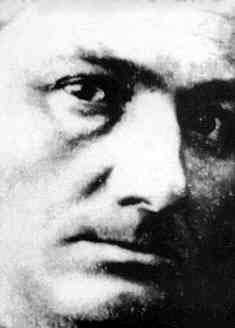
Poetry Dispatch No. 49 | January 14, 2006
GET DRUNK by Baudelaire
ONE SHOULD always be drunk. That’s the great thing; the only question. Not to feel the horrible burden of Time weighing on your shoulders and bowing you to the earth, you should be drunk without respite.
Drunk with what? With wine, with poetry, or with virtue, as you please. But get drunk.
And if sometimes you should happen to awake, on the stairs of a palace, on the green grass of a ditch, in the dreary solitude of your own room, and find that your drunkenness is ebbing or has vanished, ask the wind and the wave, ask star, bird, or clock, ask everything that flies, everything that moans, everything that flows, everything that sings, everything that speaks, ask them the time; and the wind, the wave, the star, the bird and the clock will all reply: “It is Time to get drunk! If you are not to be the martyred slaves of Time, be perpetually drunk! With wine, with poetry, or with virtue, as you please.”
from PARIS SPLEEN

 Charles Pierre Baudelaire (April 9, 1821 – August 31, 1867) was an influential nineteenth century French poet, critic, and acclaimed translator.
Charles Pierre Baudelaire (April 9, 1821 – August 31, 1867) was an influential nineteenth century French poet, critic, and acclaimed translator.
Baudelaire was born in Paris. His father, a senior civil servant and amateur artist, died early in Baudelaire’s life in 1827. In the following year, his mother married a lieutenant colonel Jacques Aupick, who later became a French ambassador to various courts. Baudelaire was educated in Lyon and at the Lycée Louis-le-Grand in Paris. Upon gaining his degree in 1839, he decided to embark upon a literary career, and for the next two years led an irregular life. He may have contracted syphilis during this period. In the hope of reforming him, his guardians sent him on a voyage to India in 1841, but he never arrived. When he returned to Paris, after less than a year’s absence, he received a small inheritance, but he spent it within a few years. His family obtained a decree to place his property in trust. During this time he met Jeanne Duval, who was to become his longest romantic association.
His art reviews of 1845 and 1846 attracted immediate attention for their boldness; many of his critical opinions were novel in their time, but have since been generally accepted. He took part in the Revolutions of 1848, and for some years was interested in republican politics, but his political convictions spanned the anarchism of Pierre-Joseph Proudhon, the history of the Raison d’Ėtat of Giuseppe Ferrari, and ultramontane critique of liberalism of Joseph de Maistre.
Baudelaire was a slow and fastidious worker, and it was not until 1857 that he published his first and most famous volume of poems, Les Fleurs du mal (“The Flowers of Evil“). Some of these poems had already appeared in the Revue des deux mondes (Review of Two Worlds), when they were published by Baudelaire’s friend Auguste Poulet Malassis, who had inherited a printing business at Alençon. The poems found a small appreciative audience, but greater public attention was given to their subject matter. The principal themes of sex and death were considered scandalous, and the book became a byword for unwholesomeness among mainstream critics of the day. Baudelaire, his publisher, and the printer were successfully prosecuted for creating an offense against public morals. In the poem “Au lecteur” (“To the Reader“) that prefaces Les fleurs du mal, Baudelaire accuses his readers of hypocrisy and of being as guilty of sins and lies as the poet:
… If rape or arson, poison, or the knife
Has wove no pleasing patterns in the stuff
Of this drab canvas we accept as life—
It is because we are not bold enough!
(Roy Campbell’s translation)
Six of the poems were suppressed, but printed later as Les Épaves (“The Wrecks“) (Brussels, 1866). Another edition of Les fleurs du mal, without these poems, but with considerable additions, appeared in 1861.
His other works include Petits Poèmes en prose (“Small Prose poems“); a series of art reviews published in the Pays, Exposition universelle (“Country, World Fair”); studies on Gustave Flaubert (in L’Artiste, October 18, 1857); on Théophile Gautier (Revue contemporaine, September, 1858); various articles contributed to Eugene Crepet’s Poètes francais; Les Paradis artificiels: opium et haschisch (“French poets; Artificial Paradises: opium and hashish“) (1860); and Un Dernier Chapitre de l’histoire des oeuvres de Balzac (“A Final Chapter of the history of works of Balzac”) (1880), originally an article entitled “Comment on paye ses dettes quand on a du génie” (“How one pays one’s debts when one has genius”), in which his criticism turns against his friends Honoré de Balzac, Théophile Gautier, and Gérard de Nerval.
Baudelaire learned English in his childhood, and Gothic novels, such as Lewis’s The Monk, became some of his favourite reading matter. In 1846 and 1847 he became acquainted with the works of Edgar Allan Poe, in which he found tales and poems which had, he claimed, long existed in his own brain but never taken shape. From this time until 1865, he was largely occupied with translating Poe’s works; his translations were widely praised. These were published as Histoires extraordinaires (“Extraordinary stories“) (1852), Nouvelles histoires extraordinaires (“New extraordinary stories“) (1857), Aventures d’Arthur Gordon Pym (see The Narrative of Arthur Gordon Pym), Eureka, and Histoires grotesques et sérieuses (“Grotesque and serious stories“) (1865). Two essays on Poe are to be found in his Oeuvres complètes (“Complete works“) (vols. v. and vi.).
His financial difficulties increased, particularly after his publisher Poulet Malassis went bankrupt in 1861, and in 1864 he left Paris for Belgium, partly in the hope of selling the rights to his works. For many years he had a long-standing relationship with a mixed-race woman, Jeanne Duval, whom he helped to the end of his life. He smoked opium, and in Brussels he began to drink to excess. He suffered a massive stroke in 1866 and paralysis followed. The last two years of his life were spent in “maisons de santé” in Brussels and in Paris, where he died on August 31, 1867. Many of his works were published posthumously.
He is buried in the Cimetière du Montparnasse, Paris.
Baudelaire’s influence on the direction of modern French- and English-language literature was considerable. The most significant French writers to come after him were generous with tributes; four years after his death, Arthur Rimbaud praised him in a letter as ‘the king of poets, a true God‘. In 1895, Stéphane Mallarmé published a sonnet in Baudelaire’s memory, ‘Le Tombeau de Charles Baudelaire’. Marcel Proust, in an essay published in 1922, stated that along with Alfred de Vigny, Baudelaire was ‘the greatest poet of the nineteenth century’.
In the English-speaking world, Edmund Wilson credited Baudelaire as providing an initial impetus for the Symbolist movement, by virtue of his translations of Poe.In 1930 T.S. Eliot, while asserting that Baudelaire had not yet received a ‘just appreciation’ even in France, claimed that the poet had ‘great genius’ and asserted that his ‘technical mastery which can hardly be overpraised … has made his verse an inexhaustible study for later poets, not only in his own language.’
At the same time that Eliot was affirming Baudelaire’s importance from a broadly conservative and explicitly Christian viewpoint, left-wing critics such as Wilson and Walter Benjamin were able to do so from a dramatically different perspective. Benjamin translated Baudelaire’s Tableaux Parisiens into German and published a major essay on translation as the foreword. In the late 1930s, Benjamin used Baudelaire as a starting point and focus for his monumental attempt at a materialist assessment of 19th century culture, Das Passagenwerk. For Benjamin, Baudelaire’s importance lay in his anatomies of the crowd, of the city and of modernity.
Baudelaire was also an influence on H. P. Lovecraft, serving as a model for Lovecraft’s decadent and evil characters in both The Hound and Hypnos.



























































The poem says it all…except, I’d like to thank you for posting it online like this because most of the other translations aren’t that good. What a poem.
Yes, thanks for posting this great poem. This is a good translation, but Louis Simpson’s is better.
[…] charles baudelaire | get drunk October 2007 2 comments 5 […]
I learned my chain of influences in reverse: Lovecraft before Baudelaire. And then I find this page on a Google search. Who says I’ve lost my portable irony?
[…] [via Poetry Dispatch and Other Notes from the Underground] Share: […]
[…] charles baudelaire | get drunk « poetry dispatch & other notes from …Oct 10, 2007 … Drunk with what? With wine, with poetry, or with virtue, as you please. But get drunk. And if sometimes you should happen to awake, on the … […]